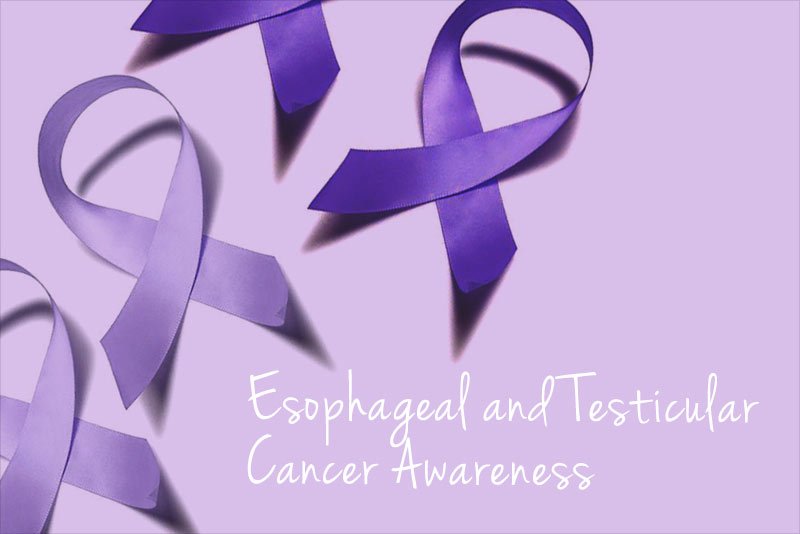April Esophageal and Testicular Cancer Awareness

[vc_row][vc_column width=”1/2″][vc_column_text]
The month of April is a double-header in terms of cancer awareness: Esophageal Cancer Awareness and Testicular Cancer Awareness
Esophageal Cancer
If you are like most people, you may not fully understand how the esophagus functions in our body, or, the important role it plays in facilitating our daily health and nourishment. The esophagus is the food pipe that connects your throat to your stomach. Rings of muscle in the esophagus contract and relax, allowing liquid and food to pass through, ready for digestion.
Cancer of the esophagus or esophageal cancer is the sixth most common cause of cancer deaths worldwide, and it afflicts more men than women. Esophageal cancer occurs when cells in your esophagus mutate and divide out of control thus forming a tumor in the esophagus that prevents it from functioning the way it should.
Educating yourself about how to identify the warning signs and prevention methods for esophageal cancer are critical as its causes are not exactly clear. Further, early esophageal cancer typically causes no signs or symptoms and is often undetectable.
In its later stages, symptoms of esophageal cancer include difficulty swallowing; unintentional weight loss; chest pain; pressure or burning; worsening indigestion or heartburn; and, coughing or hoarseness. For the most part, recommended prevention measures are what one would expect, and in fact, should be adopted as standard practice for preventing ALL cancers. To prevent esophageal cancer:
- Do not smoke
- Drink alcohol in moderation, if at all (two drinks a day for men age under 65, and one drink a day for women of all ages and men over 65)
- Eat more fruits and vegetables
- Maintain a healthy weight. If you are not sure what your healthy weight should be, ask your primary care physician.
Testicular Cancer:
Overall, about one in 280 American men will develop testicular cancer at some time in their lives. It can occur in men at any age and is the most common cancer in men between 20 and 35. Testicular cancer is more common among white males than blacks, Asian, Hispanic or Native American males.
Risk factors for testicular cancer include: having an undescended testicle, having had abnormal development of the testicles, and, having a personal or family history of testicular cancer.
Men themselves find most cases of testicular cancer, either by accident or self-examination, similar to the detection of breast cancer in women. So learning how to perform a testicular self-examination (TSE) is a good starting point for prevention. Early warning signs include a painless lump or swelling in the testicles; pain or discomfort in the testicle or scrotum; any enlargement of the testicle or change in the way it feels; and, a feeling of heaviness in the scrotum.
Therapy is extremely effective for testicular cancer and the preferred treatment is to surgically remove the affected testicle, which will NOT cause impotence but can cause infertility. Chemotherapy or radiation therapy, and bone marrow transplants are also necessary, in certain cases.
If testicular cancer is treated early, before it spreads to the lymph nodes, the cure rate is greater than 96%.
So to all of the men out there who are reading this, please learn how to perform a TSE and practice it on a monthly basis, and, don’t delay going to the doctor when you notice one of the warning signs!
To read more about risk factors, warning signs, early detection, and the prevention of esophageal and testicular cancers, click on the link above — Your Own Health — and learn the easy, smart steps you can take to reduce your risk for these and other cancers.
For more educational smart tips about specific cancers every month — this month, highlighting esophageal and testicular cancers — we also encourage you to visit and “like” National Cancer Center’s Facebook page (FB icon here).
Spring back into good health with NCC’s educational messages and smart tips!
Happy and Healthy April to all of our readers![/vc_column_text][/vc_column][vc_column width=”1/2″][vc_single_image source=”external_link” custom_src=”https://nationalcancercenter.org/wp/wp-content/uploads/2019/03/esphogeal-testicular-cancer-awareness.jpg”][/vc_column][/vc_row]


